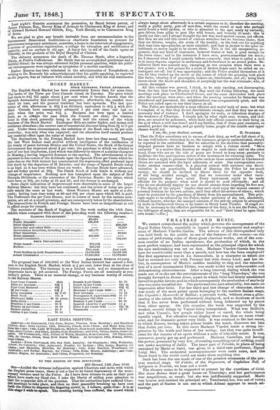TO THE EDITOR OF ME SPECTATOR.
402 Strand, 14th Tune 1848. SIR—Amidst the virtuous indignation against Chartists and mobs with which the English press teems, there is not a line to be found deprecatory of the unne- cessary violence used by the Police. As I have been witness to acts on their part which have made my blood rise, I take the liberty of calling your attention to that the unpopular aide of the question. That the authorities have suffered Char- tist meetings to take place, and then on their peaceably breaking up have sent forth the Police to disperse the lingering crowd, is, I believe, quite true: it is at this stage I wish to speak, The meeting baying been suffered, the crowd which always hangs about afterwards is a certain sequence to it; therefore the meeting, really a guilty party, gets off scot-free, while the crowd or mob who perhaps never heard a word spoken, or who is attracted to the spot solely by curiosity, gets driven from pillar to post like wild beasts, and brutally ill-used: this is surely not fair; and I always thought the law was used against causes, not effects. But then we are told this crowd of carious wretches had no business there; that they are thieves, roughs, the scum of the locality, on the look-out for anything that may turn up—plunder, or mere mischief; and that in justice to the quiet in- habitants no mercy ought to be shown them. This is the old exasperating ar- gument, that any kind of treatment, however brutal or bad, is good enough for the lower class; and in the instances I have seen, proves somewhat too much; for I observed what I could scarcely believe,—namely, that what is called a mob is in many degrees superior in endurance and forbearance to an armed police. Re- taliation there was scarcely any, excepting on one occasion when there were a few groans: now a few groans for a score of broken heads can't be called an ex- travagant set-off; but it was opportunity; and the Police availed themselves of it too, for they rushed up the street at the corner of which the groaning took place like furies, clearing it of passengers, lookers-on, inhabitants, and all; using their staves about the heads and shoulders of everybody but the real criminals; Who, of course, decamped.
All this violence was proved, I think, to be only exciting, not discouraging, from the fact that from Monday 29th May until the Friday following, the same meetings took place on Clerkenwell Green, and the same skirmishes took place after the meetings were over; and when the meeting intended for Saturday was interdicted and prevented, the neighbourhood was comparatively quiet, and the Police not called upon to use their staves at all.
The Police are undoubtedly a most efficient and useful body of men; but what I complain of is that they do not discriminate enough, and that they use an un- necessary deal of violence. I don't apologize for mobs, or ridiculous displays of the weakness of Chartism. I simply ask, by what right men, women, and chil- dren, are assailed by policemen, when their only offence consists in their being on the spot where a mob has been? and I say further, that if these poor creatures, so assailed, pocket the outrage, and go quietly home, people of the middle and upper classes would not.
I am, Sir, your obedient servant, H. SPARKS& [That the Police sometimes act in excess of their duty, as well as fall short of it, we can well believe: when they do so, the instances, properly authenticated, should be reported to the authorities. But we subscribe to the doctrine that peaceably- disposed persons have no business to mingle with a riotous crowd. "Mere curiosity " is a motive that deserves no respect in such cases; and on the other hand, those who are on the side of peace are bound to keep away, precisely to facilitate the free and vigorous action of the instrument for restoring order. The Police have a right to presume that mobs such as those assembled in Clerkenwell Green are unmixed with the loyal adherents of order. Our correspondent over- looks another reason—that in a physical contest with numbers nice discri- mination is not practicable. Instead of blaming the Police for too much energy, we should be inclined to blame them for the opposite fault, of not being decided enough, but that we remember under what vacil- lating councils they have acted. Every instrument ought to be made efficient for its purpose: when used it should be used effectually; and all who do not absolutely dispute its use should abstain from impeding its free use. "The liberty of the subject" implies that each shall enjoy the utmost amount of personal freedom for his own actions, until they affect the actions of others; which must be protected by the guardians of liberty from his eperoachment. This prin- ciple ought to be enforced bythe Police, under guidance of the law, absolutely, without reserve,' whether the usurped coercion of the orderly subject be attempted by mobs in Clerkenwell Green or by rioters in Drury Lane Theatre. If rough ac- tiop be necessary to the effective performance of the duty, it is not the Police, but the infringers of order, that are responsible for it; and " their blood be upon their own heads."—En.]
























 Previous page
Previous page